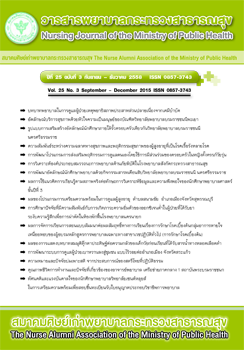ความหมายและปัจจัยบ่มเพาะสติ จากประสบการณ์ของสตรีไทย ที่ปฏิบัติธรรม
Main Article Content
Abstract
บทคัดย่อ
การศึกษานี้เป็นการวิจัยเชิงคุณภาพ มีวัตถุประสงค์เพื่อบรรยายความหมายและปัจจัยบ่มเพาะสติ จากประสบการณ์ของสตรีไทยที่ปฏิบัติธรรม คัดเลือกผู้ให้ข้อมูลแบบเฉพาะเจาะจง ประกอบด้วยสตรีผู้ปฏิบัติธรรม 2 กลุ่ม ได้แก่ สตรีผู้บวชในพุทธศาสนา จำนวน 6 คน และสตรีผู้ปฏิบัติธรรมโดยไม่ได้บวช จำนวน 7 คนเก็บรวบรวมข้อมูลโดยใช้การสัมภาษณ์แบบเจาะลึก เครื่องมือที่ใช้ในการเก็บรวบรวมข้อมูล คือ แบบสอบถามข้อมูลทั่วไป และแนวคำถามในการสัมภาษณ์แบบกึ่งโครงสร้าง ซึ่งผู้วิจัยสร้างขึ้น และวิเคราะห์ข้อมูลโดยใช้การวิเคราะห์เนื้อหา
ผลการศึกษาพบว่า สตรีไทยที่ปฏิบัติธรรมบรรยายประสบการณ์ใน 2 ประเด็นหลักคือ ความหมาย และปัจจัยบ่มเพาะสติ โดยความหมายของสติมี 4 ประเด็นย่อย คือ 1) การอยู่กับปัจจุบันขณะ 2) ตระหนักรู้ตนเอง 3) ใคร่ครวญตามความเป็นจริง และ 4) เป็นกลาง เป็นธรรมชาติ ในส่วนของปัจจัยบ่มเพาะสติ มี 2 ประเด็นย่อย คือ 1) ปัจจัยภายในบุคคล ซึ่งมี 4 หัวข้อ ได้แก่ (1) การมีศรัทธาและฉันทะ (2) การมีศีล (3) ความพร้อมของร่างกาย และ (4) การหมั่นฝึกฝน และ 2) ปัจจัยภายนอกบุคคล ซึ่งมี 2 หัวข้อ ได้แก่ (1) การอยู่ในสถานที่สงบ และ (2) การที่ได้เรียนรู้หรือมีการศึกษา การศึกษานี้ทำให้เข้าใจความหมายของสติ และทราบปัจจัยบ่มเพาะสติ ของสตรีไทยที่ปฏิบัติธรรม ซึ่งสามารถนำมาเป็นแนวทางในการส่งเสริมสุขภาพจิต และพัฒนาโปรแกรมการบำบัดทั้งทางกายและทางจิตโดยใช้สติเป็นฐาน ตลอดจนพัฒนาเครื่องมือประเมินการมีสติในบริบทของไทย
คำสำคัญ: การปฏิบัติธรรม; การวิจัยเชิงคุณภาพ; สติ; สตรีไทย
*การวิจัยนี้เป็นส่วนหนึ่งของโครงการวิจัยเรื่อง “การประเมินภาวะการมีสติแบบข้ามวัฒนธรรม: การวิเคราะห์ด้วยวิธีการผสมผสาน”
**วิทยาลัยพยาบาลบรมราชชนนี จักรีรัช อีเมล์ติดต่อ : sukjai@ckr.ac.th
***วิทยาลัยพยาบาลบรมราชชนนี ชลบุรี
****มหาวิทยาลัยแปซิฟิก สหรัฐอเมริกา
Meaning and Cultivating Factors of Mindfulness as Experienced by Thai Females who Practice Dhamma*
Sukjai Charoensuk**
Penphan Pitaksongkram***
Michael Christopher****
Abstract
The purpose of this qualitative study was to describe meaning and cultivating factors of mindfulness as experienced by Thai females who practice Dhamma. Participants were purposively selected to include 2 groups of Thai females who practice Dhamma. The first group consisted of 6 female Buddhist monks, and the second group consisted of 7 female who practice Dhamma without ordaining. Data were collected using in-depth interview. The instruments used were demographic data questionnaire and guideline for semi-structured interview developed by researchers. Content analysis was employed to analyze the data.
The results revealed that Thai women who practice Dhamma described their experience in 2 themes, which were meaning and cultivating factors of mindfulness. The meaning composed of 4 categories; 1) Being Present, 2) Self-awareness, 3) Contemplation, and 4) Being Neutral. The cultivating factors of mindfulness composed of 2 categories; In-personal factors and Ex-personal factors. The In-personal cultivating factors included 4 sub-categories; Faith and Love, the Five Precepts, Sound body, and Practice. The Ex-personal cultivating factors included 2 sub-categories; Serenity, and Learning. These findings increase understanding about meaning of mindfulness and its cultivating factors. These could be used as a guideline to promote mental health and develop nursing interventions using mindfulness based, as well as, develop the instrument for assessing mindfulness in Thai context.
Keywords: Mindfulness; Qualitative research; Thai women; Practice Dhamma
*This study is a part of the Transcultural Mindfulness Assessment: A Mixed Methods Analysis Research Project supported
by NIH, USA.
**Boromarajonani College of Nursing, Chakriraj email: sukjai@ckr.ac.th
***Boromarajonani College of Nursing, Chon Buri
****Pacific University, U.S.A.
Article Details
บทความและรายงานวิจัยในวารสารพยาบาลกระทรวงสาธารณสุข เป็นความคิดเห็นของ ผู้เขียน มิใช่ของคณะผู้จัดทำ และมิใช่ความรับผิดชอบของสมาคมศิษย์เก่าพยาบาลกระทรวงสาธารณสุข ซึ่งสามารถนำไปอ้างอิงได้
